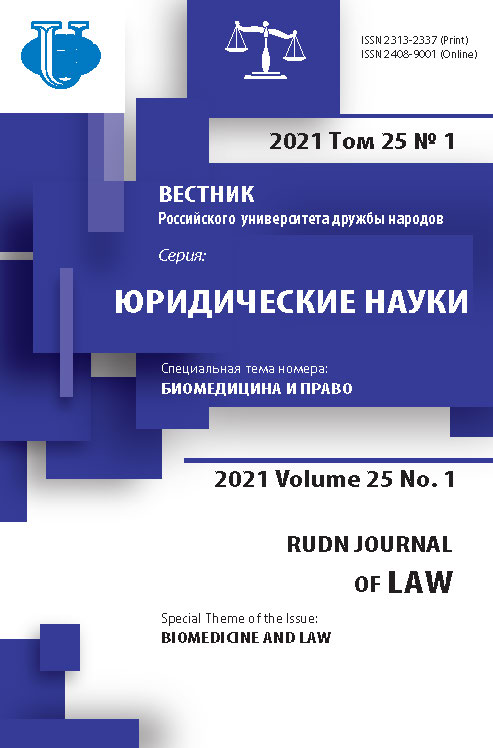Legal and ethical regulation of genetic research
- Authors: Przhilenskiy V.I.1
-
Affiliations:
- Kutafin Moscow State Law University (MSAL)
- Issue: Vol 25, No 1 (2021): BIOMEDICINE AND LAW
- Pages: 214-231
- Section: BIOETHICS AND LAW
- URL: https://journals.rudn.ru/law/article/view/26044
- DOI: https://doi.org/10.22363/2313-2337-2021-25-1-214-231
- ID: 26044
Cite item
Full Text
Abstract
The paper deals with the problems of genetic research regulation stemming from the peculiarities of this area of knowledge where research is practically inseparable from patient treatment, and cognitive practices are connected with the development and implementation of new devices, methodologies, and technologies to a much greater extent than in other areas of human activity. The issues of genetic research regulation are analyzed in the context of the concept suggested by Helga Nowotny and Giuseppe Testa distinguishing three human technologies of standardization through which control over the development of knowledge about genes is exercised. These three technologies are law, governance and bioethics, and the efficiency of their interaction is declared a necessary and sufficient condition for the successful development of molecular genetic sciences. The paper examines all the three technologies one by one, identifies the specifics and difficulties of their implementation in present-day Russian science, and assesses the genetic research prospects assuming the implementation of the aforementioned technologies. Particular attention is paid to institutionalization of ethics committees as an element of the genetic research regulation system. Substantiation is provided for the thesis that ethical committees should act as an institution combining rulemaking, management, and expert functions rather than as a structure capable of performing advisory and recommendatory functions only. The ability of the Russian society and state to withstand the grand challenges of our time is associated with the success in solving this problem.
Keywords
About the authors
Vladimir I. Przhilenskiy
Kutafin Moscow State Law University (MSAL)
Author for correspondence.
Email: viprzhilenskij@msal.ru
Doctor of Sciences (Philosophy), Full Professor, Department of Philosophy and Sociology
9 Sadovaya - Kudrinskaya str., Moscow, 123995, Russian FederationReferences
- Apresyan, R.G. (2012) Ethical Review: Agent, Subject, Procedures. In: Bakshtanovsky, V. & Novoselov, V. (eds.). Applied Ethics: Expertise. Experts Potential. Semestrial Papers of Applied Ethics. Issue 41. Tyumen, Applied Ethics Research Institute Publ. 105-122. (in Russian)
- Belkina, G.L. & Korsakov, S.N. (2008) I.T. Frolov and the Formation of Domestic bioethics. In: Bioethics and humanitarian expertise. Issue 2. Moscow, IP RAS Publ. pp. 18-54. (in Russian)
- Bostrom, N. (2016) Superintelligence: Paths, Dangers, Strategies. Oxford University Press, Oxford
- Funtowicz, S., Shepherd, I., Wilkinsoon, D. & Ravetz, J. (2000) Science and Governance in the European Union: a Contribution to the debate. Science and Public Policy. 27(5), 327-336
- Habermas, J. (2000) The Inclusion of the Other: Studies in Political Theory. In: Cronin, C.P. & De Greiff, P. (eds.). From Series: Studies in Contemporary German Social Thought. The MIT Press
- Jasanoff, S. (2004) States of knowledge: the co-production of science and the social order. London, Routledge
- Latour, B. (1987) Science in Action: How to Follow Scientists and Engineers. Cambridge Massachusetts, Harvard University Press
- Latour, B. (1998) From the world of science to the world of research? Science. (280)5361, 208- 209. Available from: http://www.ub.edu/prometheus21/articulos/obsprometheus/Latour 208.pdf. [Accessed 11th November 2020]
- Marelli, L., Lievevrouw, E. & Van Hoyweghen, I. (2020) Fit for purpose? The GDPR and the governance of European digital health. Policy Studies. 41(5), 1-21
- Meshcheryakova, T.V. (2010) The reasons for the emergence of bioethics. Bulletin of the Tomsk State University. Philosophy. Sociology. Political science. 4 (12), 90-100. (in Russian)
- Nowotny, H. & Testa, G. (2010) Naked genes: rethinking the human in the molecular age. The MIT Press
- Popova, O.V. (2015) Biotechnological construction of artificial - natural: social context. Knowledge. Understanding. Skill. (2), 161-171. (in Russian)
- Potter, V.R. (1971) Bioethics: Bridge to the future. Englewood Cliffs, N. J. Prentice-Hall
- Pronin, M.A. (2015) Virtualistics in the Institute of Human studies of the Russian Academy of Sciences. Moscow, IF RAN Publ. (in Russian)
- Pronin, M.A., Yudin, B.G. & Sineokaya, Yu.V. (2017) Philosophy as Expertise. The Philosophy Journal. 10(2), 79-96. doi: 10.21146/2072-0726-2017-10-2-79-96. (in Russian)
- Ravetz, J. R. & Funtowicz, S.O. (1999) Post-normal, Science: an Insight Now Maturing. Futures. 31(7), 641-646
- Ravetz, J.R. (1993) Science for the Post-Normal Age. Futures. 25(7), 735-755
- Regalado, A. (2018) Chinese scientists are creating CRISPR babies. MIT Technology Review. Available from: https://www.technologyreview.com/2018/11/25/138962/exclusivechinese-scientists-are-creating-crispr-babies/ [Accessed 19th November 2020]
- Stepin, V.S. (1992) Philosophical anthropology and philosophy of science. Moscow, Higher school Publ. (in Russian)
- Stepin, V.S. (2000) Self-developing Systems and perspectives of Technogenic Civilization. In: Arshinov, V.I., Budanov, V.G. & Voitsekhovich, V.E. (eds.). Synergetic paradigm. Diversity of searches and approaches. Moscow, Progress-Tradition Publ. рр. 107-120. (in Russian)
- Tishchenko, P.D. (2001) Bio-power in the era of biotechnology. Moscow, IP RAS Publ. (in Russian)
- Tishchenko, P.D. (2012) Convergence of biological, informational, nano- and cognitive technologies: a challenge to philosophy (materials of the “round table”). Problems of Philosophy. (12), 3-23. (in Russian)
- Tishchenko, P.D. & Yudin, B.G. (2011) Bioethics and journalism: Moscow, Adamant Publ. (in Russian)
- Torres-Padilla, M.-E., Bredenoord, A.L., Jongsma, K.R., Lunkes, A., Marelli, L., Pinheiro, I. & Testa, G. (2020) Thinking “ethical” when designing an international, cross-disciplinary biomedical research consortium. The EMBO Journal. 39(19), e105725
- Yudin, B.G. (2018) How did bioethics start in Russia: Interview with B.G. Yudin. Donskikh O.A., interviewer. Ideas and Ideals. 1(2(36)), 64-74. doi: 10.17212/2075-0862-2018-2.1-6474. (in Russian)
Supplementary files















